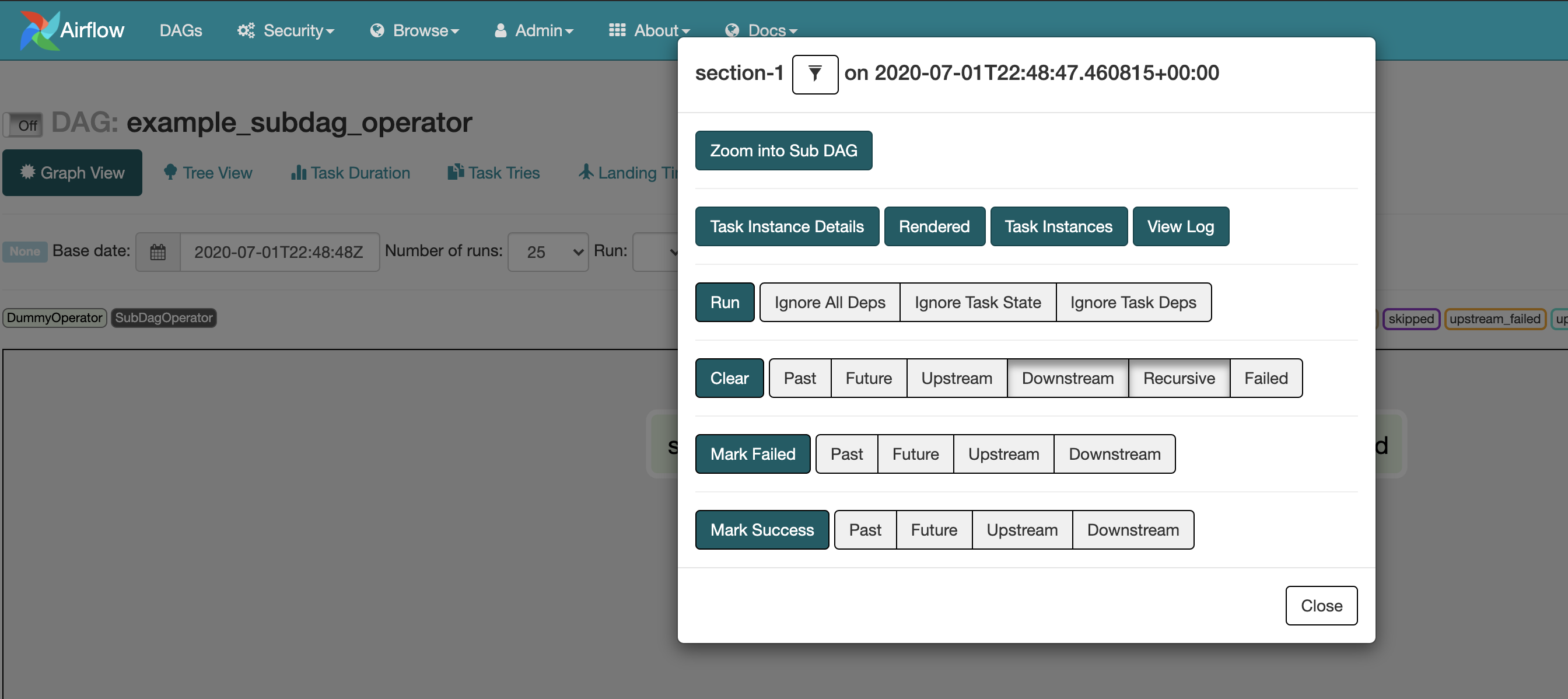

- #Apache airflow documentation update#
- #Apache airflow documentation upgrade#
- #Apache airflow documentation code#

#Apache airflow documentation upgrade#
Upgrade to Airflow 1.10.15 and test their Airflow deployment and only then upgrade to Airflow 2.0.Īirflow 1.10.x reached end of life on 17 June 2021. We strongly recommend that all users upgrading to Airflow 2.0, first That have been backported from Airflow 2.0 to make it easy for users to test their AirflowĮnvironment before upgrading to Airflow 2.0. Airflow 1.10.15 includes support for various features To minimize friction for users upgrading from Airflow 1.10 to Airflow 2.0 and beyond, Airflow 1.10.15 a.k.a “bridge release” hasīeen created.
Changes to Exception handling for from DAG callbacks. Migration Guide from Experimental API to Stable API v1. Changed Parameters for the KubernetesPodOperator. Export dynamic environment variables available for operators to use. (Optional) Adding IDE auto-completion support. Customize view of Apache from Airflow web UI. Customizing DAG Scheduling with Timetables. Configuring Flask Application for Airflow Webserver. Add tags to DAGs and use it for filtering in the UI. # This is the class you derive to create a plugin from ugins_manager import AirflowPlugin from curity import permissions from airflow.import BaseHook from .transfers.gcs_to_s3 import GCSToS3Operator # Will show up in Connections screen in a future version class PluginHook ( BaseHook ): pass # Will show up under _plugin. Make sure you restart the webserver and scheduler after making changes to plugins so that they take effect. Please note name inside this class must be specified. In the example, all options have beenĭefined as class attributes, but you can also define them as properties if you need to performĪdditional initialization. You can derive it by inheritance (please refer to the example below). Listeners can register to # listen to particular events that happen in Airflow, like # TaskInstance state changes. timetables = # A list of Listeners that plugin provides. operator_extra_links = # A list of timetable classes to register so they can be used in DAGs. # These extra links will be available on the task page in form of # buttons. global_operator_extra_links = # A list of operator extra links to override or add operator links # to existing Airflow Operators. # Note: the global operator extra link can be overridden at each # operator level. These extra links will be available on the # task page in the form of buttons. perform Plugin boot actions pass # A list of global operator extra links that can redirect users to # external systems. # NOTE: Ensure your plugin has *args, and **kwargs in the method definition # to protect against extra parameters injected into the on_load(.) # function in future changes def on_load ( * args, ** kwargs ): #. See example below appbuilder_menu_items = # A callback to perform actions when airflow starts and the plugin is loaded. See example below appbuilder_views = # A list of dictionaries containing kwargs for FlaskAppBuilder add_link. For use with the flask_appbuilder based GUI flask_blueprints = # A list of dictionaries containing FlaskAppBuilder BaseView object and some metadata. Loaded/parsed in any long-running Airflow process.)Ĭlass AirflowPlugin : # The name of your plugin (str) name = None # A list of class(es) derived from BaseHook hooks = # A list of references to inject into the macros namespace macros = # A list of Blueprint object created from flask.Blueprint. (Modules only imported by DAG files on the other hand do not suffer this problem, as DAG files are not Option is you can accept the speed hit at start up set the core.execute_tasks_new_python_interpreterĬonfig setting to True, resulting in launching a whole new python interpreter for tasks. Need to restart the worker (if using CeleryExecutor) or scheduler (Local or Sequential executors). #Apache airflow documentation update#
This does mean that if you use plugins in your tasks, and want them to update you will either This approach offers significant benefits, especially for shorter tasks.
#Apache airflow documentation code#
This avoids the slowdown associated with creating a new Python interpreterĪnd re-parsing all of Airflow’s code and startup routines. However, it will not be reflected in new running tasks after the scheduler boots.īy default, task execution uses forking. This means that if you make any changes to plugins and you want the webserver or scheduler to use that newĬode you will need to restart those processes. Start of each Airflow process, set lazy_load_plugins = False in airflow.cfg. Plugins are by default lazily loaded and once loaded, they are never reloaded (except the UI plugins areĪutomatically loaded in Webserver).






 0 kommentar(er)
0 kommentar(er)
